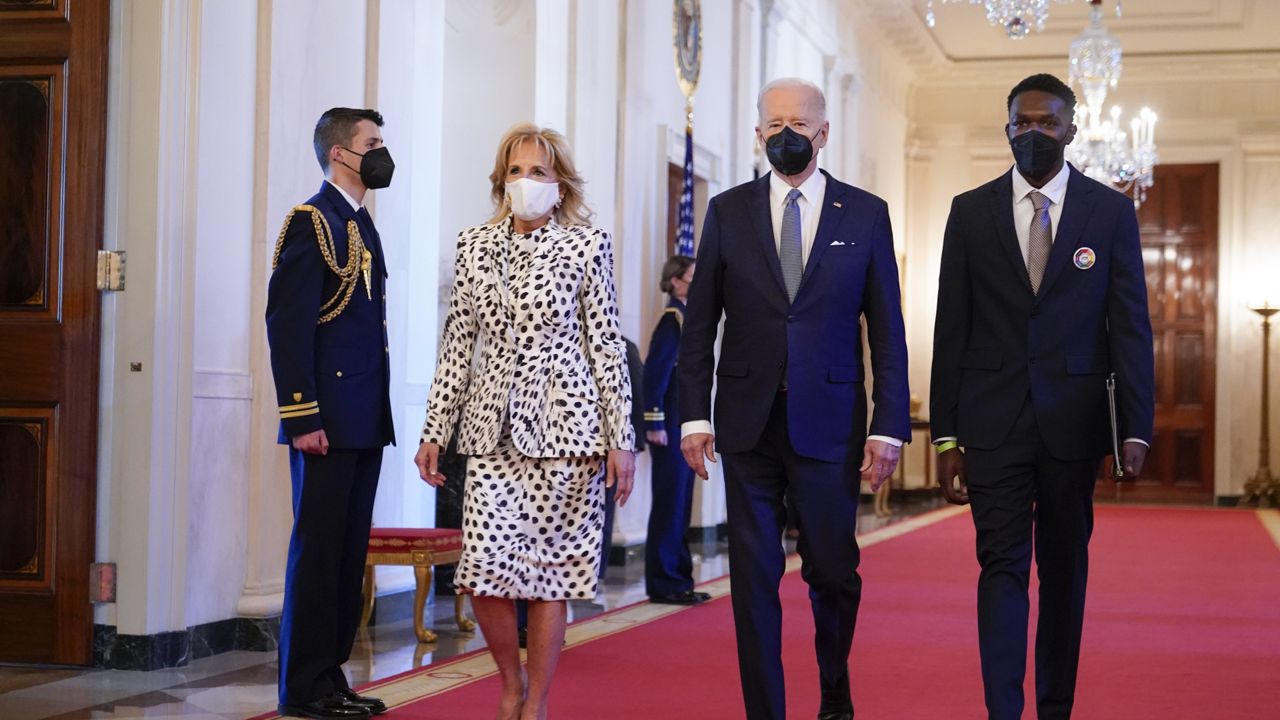The Biden administration on Monday hosted an event at the White House on the final day of Black History Month, where President Joe Biden expressed his optimism over growing racial equity in the United States – while also admitting much work remains to be done in the fight for racial justice.
“Black History Month is more than a celebration,” Biden said from the East Room of the White House. “It's a powerful, powerful reminder that Black history is American history. Black culture is American culture. Black stories are essentially an ongoing story of America.”
In attendance at Monday’s event were a number of Biden administration officials, including vice president Kamala Harris, the country’s first woman of color to hold the nation’s second-highest office.
Also present were a number of leaders in the ongoing fight for racial justice. Members of the Divine Nine – a council of historically Black fraternities and sororities – also joined the White House event.
The president began his speech by recapping his administration’s efforts to combat systemic racism and inequality, pointing in part to his nomination of Judge Ketanji Brown Jackson to the Supreme Court. Should she be confirmed by the senate, Brown Jackson would be the first Black woman to serve on the nation’s highest court.
“Jackson is going to be an outstanding justice,” Biden said Monday. “She's part of an incredible group of Black women who we have nominated to the federal bench. We've nominated more Black women in the federal bench than any administration in the history of the United States.”
Biden listed a number of other accomplishments from his first year in office, like his move to mark June 19 as Juneteenth National Independence Day, making it the country’s 11th federally-recognized holiday.
Juneteenth, also known as Emancipation Day and Freedom Day, commemorates when the last enslaved African Americans learned they were free on June 19, 1865 in Galveston, Texas — nearly two years after Abraham Lincoln signed the Emancipation Proclamation.
Though slavery was not completely abolished until the 13th Amendment, which came six months later, Juneteenth has come to symbolize the end of slavery.
At the outset of his presidency, Biden signed an executive order directing the government to make racial equity a priority across all federal agencies and departments.
“When I took office, I said the American story depends not on how many of us – but any one of us. Not on some of us – but on all of us,” Biden said at Monday’s event. “So we're investing in all of us.”
Still, the president acknowledged that minority communities still struggle under the weight of systemic oppression, whether it be access to clean drinking water to the availability and price of prescription drugs.
One issue the administration continues to focus on is communities suffering from environmental racism. Numerous studies have shown that minority communities are exposed to higher rates of air pollution and toxic waste than their non-Hispanic, white counterparts. Lead in water is most commonly found in minority communities, with one report finding that over half of those who live within a 2-mile radius of toxic waste sites are people of color.
Aspects of Biden’s bipartisan infrastructure law, signed last year, are earmarked for issues of environmental justice like improving water infrastructure in marginalized communities, replacing lead pipes in all water systems nationwide and a plan to regulate toxic industrial compounds associated with serious health conditions.
Biden also promised to keep working on criminal justice issues and voting rights, two areas where the administration has made little progress in the year-plus since taking office.
Numerous states have implemented sweeping voting reforms that many experts say unfairly target voters of color, an issue where the White House has little leverage without congressional action.
Biden did issue an executive order last March that expanded access to voter registration and election information. The order is designed to make it easier for people in federal custody to register to vote, improve tracking of military ballots and provide better access for Americans with disabilities.
“We're protecting our country's threshold liberty, the sacred right to vote, which I've never seen as under such attack,” Biden said Monday. “And it's already made it harder for Blacks to vote, but this is trying to be able to figure out how to keep the Black vote when it occurs.”
The Associated Press contributed to this report.



